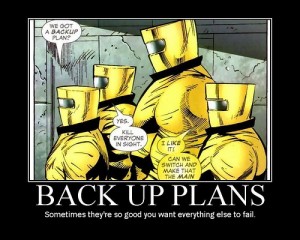
I want to talk about something that I consider to be very important, not just for companies (although it does apply to them as well) but for individuals as well. I’m talking about your “Plan B.” I hear about a lot of people who are forced to make difficult decisions every day, “do I stay at my current job or quit and try to go at it alone,” “do I take the risk or go with the sure thing.” The answer is none of the above. It’s never a good idea to put all of your eggs in one basket because if something doesn’t go the way you had planned or hoped for, you’re screwed.
So what do you do?
I highly recommend that everyone makes a “Plan B”, a “Plan C” and maybe even a “Plan D”, just in case things don’t work out with your original plan. I am always trying to think of the “what ifs” to stay ahead of the game. I try to think 2 or 3 levels deep, just like in chess. Don’t just think of your first or second move, put try to think a few moves ahead.
If the company I am trying to launch doesn’t work out then what? Personally by back up plans keep me a little more relaxed, I know if one thing doesn’t work out that I can always go on to something else. It’s a bit like writing actually. They say that when you have your own blog you should always have a few reserve posts pre-written just in case you can’t think of something to write or are away without internet access.
The same is true for life and for your career. Always think about the various options and possibilities so that you are not setting yourself up for failure. If you have a great plan but no back up plan, then what do you if your great plan fails? This can be a real self esteem and confidence crusher, unless you have other options. Now I’m not saying get crazy and spend all your time analyzing options, but think about what your choices are and slowly easy your way into them. I try to work on multiple things at once and then I shift my time depending on success. An example of what this can look like is as follows:
- Full time job/project = 30-40 hrs per week
- Side consulting = 10-15 hrs per week
- Side project = 5-10 hrs per week
- Study for MBA/etc. = 5 hrs per week
- Writing = 5 hrs per week
The hours and projects themselves can be very different but make sure you have a few things going on in your pipeline. For example, if you notice that your full time job/project is not going the way you want it to, try to allocate some more time to your consulting and side project. This is a balance game. You should always spend some time on your various tasks, but prioritize and manage your time properly. This way when one project fails or succeeds you can quickly shift gears to something else and replace the failed project with a new project.
As someone who is passionate about and has a general interest towards people, I hate to see when people get down on themselves. I hate seeing people get their confidence crushed. I want everyone to succeed in one way or another and I think that by constantly having a working pipeline of projects that you can allocate and shift time towards, you are going to be much more successful. Always try to stay busy (obviously you need some time to relax as well), if you are bored and have nothing to do, start writing a blog, go on craigslist and try to get some freelance part time writing gigs, etc.
Finally make sure you do something you love or are passionate about, time is more important than money so make YOU are happy with what you are doing with your time.
Here is a lecture on time management by the late Randy Pausch that may help you budget your time a little a better
So what is your plan B? How do you allocate your time?
Thanks for reading
Comments